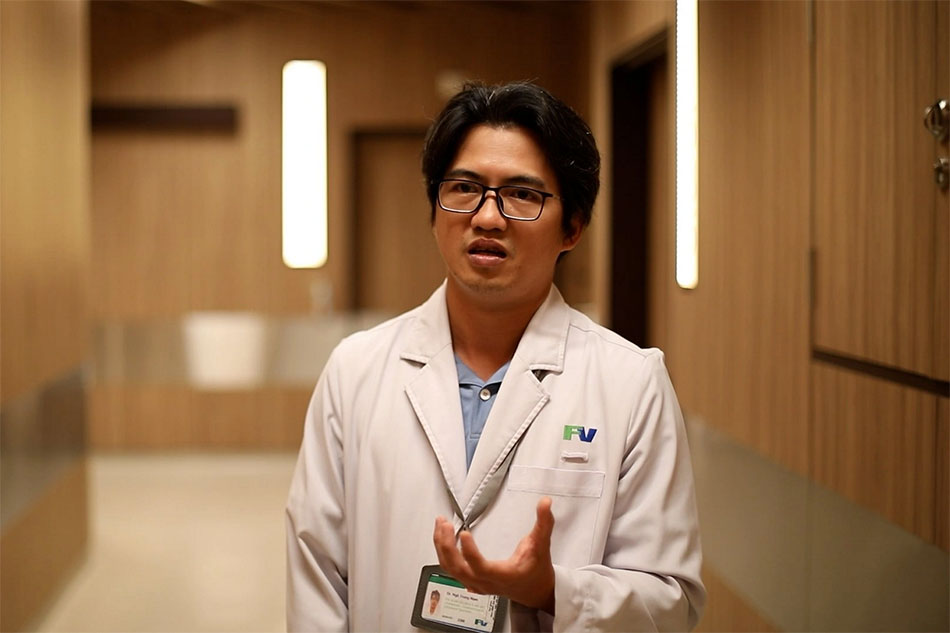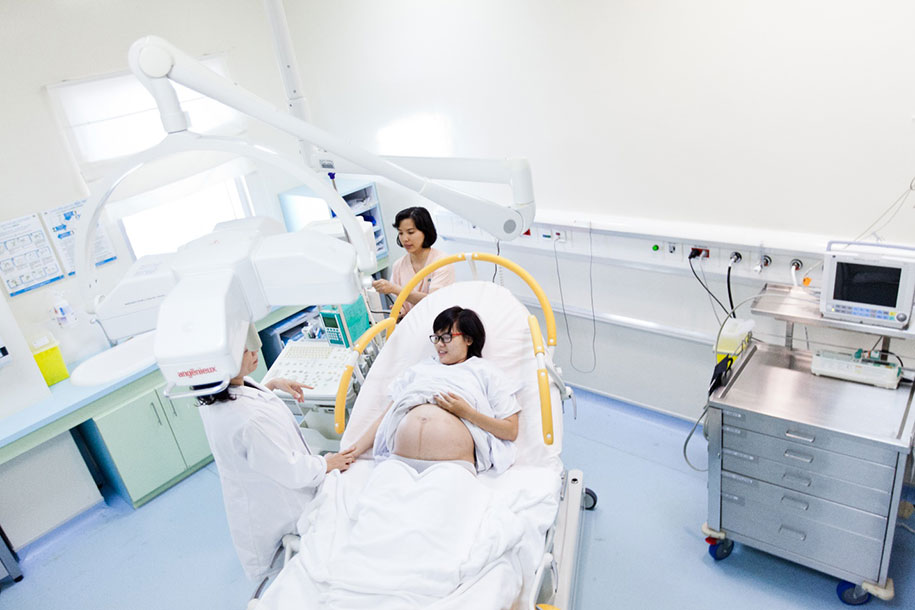As she holds her healthy new-born baby in her arms, a young FV patient weeps tears of happiness and gratitude.
This woman’s journey to safely carry her baby to term was arduous: after three consecutive miscarriages due to an abnormal gene, thanks to a personalised treatment regimen and close monitoring by FV Hospital doctors, she was able to fulfil her dream of becoming a mother.

A safe, comfortable delivery in the face of adversity, thanks to trust in doctors and FV Hospital
A 30-year-old Korean patient named J.J. and her husband live and work in District 7, HCMC. Although J.J. very much wanted to be a mother, she miscarried three times and had no idea why. When J.J. visited the Department of Obstetrics and Gynaecology, FV Hospital, she was advised by Dr Ngo Trung Nam that the team there needed to perform a range of tests to determine the cause of her miscarriages and the risks moving forward before trying for another pregnancy.
After reviewing J.J.’s test results, Dr Trung Nam discovered that she carried an abnormal gene, which made it likely that blood clots would form during pregnancy – a syndrome which causes some patients to miscarry many times. “This issue accounts for one per cent of unexplained miscarriages,” says Dr Nam.

Dr Ngo Trung Nam cares for J.J. during her pregnancy
Pregnant women with this rare gene abnormality are prescribed a low dose of anticoagulants every day. The use of this medication is closely monitored and controlled to be safe for expecting mothers during pregnancy.
Patients are also monitored in accordance with an automated foetal growth chart via French software, which provides an overview of the pregnancy evolves between visits. “This system enables us to monitor and evaluate the index of the size and healthy weight of the foetus in the womb,” explains Dr Nam.
“It also includes assessment software that can deeply analyse foetal health using information that cannot be evaluated by humans, as well as provide remote monitoring to help doctors choose the right time to deliver the baby before complications occur. High-risk pregnancies can result in high blood pressure, known as preeclampsia, gestational diabetes and intrauterine growth retardation.”
On the morning of November 25, J.J. and her baby daughter were ready to be discharged from the hospital. J.J happily shared: “During the pregnancy, I lived a normal life and didn’t have to any special precautions. Now that I’ve delivered my daughter, we both continue to be in very good health. Our family is very happy and grateful to Dr Nam and FV Hospital for giving us our precious baby girl.”
J.J. was not the first case of consecutive miscarriages received and supported by FV Hospital to deliver a successful baby. Dr Nam explains that a key component to successful care in this circumstance is that the mother-to-be fully trusts their medical team. She must share information with doctors during each visit so that her care team can devise a clear treatment plan, step by step. In turn, doctors will share every consideration of that personalised regimen so the patient understands it fully, along with potential issues to look out for and benefits of each element, so that the treatment is fully optimised.
Detecting and managing high-risk pregnancies
“The term ‘high-risk pregnancy’ refers to any pregnancy that presents a health risk to the pregnant woman, foetus or both. This general term covers a lot of issues, many of which have not arisen during pregnancy. The most common high-risk pregnancies seen at FV include gestational diabetes, high blood pressure, (known as preeclampsia) and intrauterine growth retardation,” explains Dr Vo Trieu Dat, Deputy Head of FV’s Obstetrics and Gynaecology Department.
“When couples visit FV Hospital before pregnancy, doctors always encourage them to check for a variety of health problems, including recessive gene testing. If the mother has a medical condition that is not well controlled, the disease can worsen during pregnancy and lead to negative outcomes such as the risk of preterm birth or stillbirth in utero.”

A pregnant patient receives advice on managing a high-risk pregnancy from Dr Vo Trieu Dat at FV’s Department of Obstetrics and Gynaecology.
According to Dr Dat, a pregnant woman with a high-risk pregnancy should be scheduled for follow-ups by an obstetrician-gynaecologist. The doctor will check the entire reproductive health of the patient to identify risk factors, especially risks to pregnancy and delivery.

Expecting mothers with high-risk pregnancies will be closely monitored at every stage.
During antenatal check-ups, doctors will continuously evaluate foetal development, performing an ultrasound and blood tests, among other methods to screen the foetus for chromosomal abnormalities and check signs of foetal growth. Obstetricians will then use these results to assess the development of the foetus, and may decide to prescribe adjuvant drugs to reduce the risk frequency.
To learn about high-risk pregnancies, please contact FV Hospital at: (028) 54 11 33 33.

 Vi
Vi 












